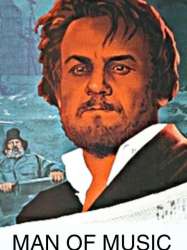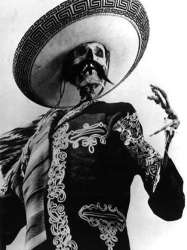Édouard Tissé is a Actor, Director, Director of Photography and Editor born on 1 april 1897 at Liepāja (Lettonie)

Édouard Tissé (en letton : Eduards Tisē) (1897-1961) est un caméraman, réalisateur et acteur letton, il fut notamment le directeur de la photographie de tous les films de Sergueï Eisenstein.
Source : Wikidata
Édouard Tissé

- Infos
- Photos
- Best films
- Family
- Characters
- Awards
Birth name Eduards Tisē
Birth 1 april 1897 at Liepāja (Lettonie)
Death 18 november 1961 (at 64 years) at Moscow (Russie)
Awards State Stalin Prize
Birth 1 april 1897 at Liepāja (Lettonie)
Death 18 november 1961 (at 64 years) at Moscow (Russie)
Awards State Stalin Prize
Biography
Né le 1er avril 1897 à Liepāja dans le gouvernement de Courlande, aujourd'hui en Lettonie, Édouard Tissé se passionne très tôt pour la peinture. C'est à la fin de ses études d'art et de photographie, en 1914, que Tissé devient réalisateur officiel au front pour l'armée russe. Après la Révolution russe, en 1918, il sera chargé de photographier la fête du 1er mai et le premier anniversaire de la Révolution de 1917. Il continue de 1918 à 1924 en travaillant en qualité d'opérateur-chroniqueur qui rend compte de la conquête de la Crimée avant la défaite de Piotr Wrangel en novembre 1920, du 2e congrès de L'Internationale Communiste du 17 juillet au 7 août 1920, du 3e congrès de l'Internationale Communiste de juin au 12 août 1921. Responsable de la section cinématographique du premier « agit-train » créé par Lénine (un train qui sillonnait toute la Russie et qui répandait la propagande de l'État), il rencontre Dziga Vertov avec lequel il réalisera des documentaires. La même année, il est aussi le caméraman du premier film de fiction produit par l'État soviétique, Le Signal, réalisé par Alexandre Arkatov. En 1921, Édouard Tissé commence à enseigner à l'Institut national de la cinématographie. À partir de 1924, il devient le caméraman et le directeur de la photographie de tous les films de Sergueï Eisenstein. Au mois de mars-avril 1926, avec Eisenstein ils entament leur voyage en Europe par la visite des studios UFA à Berlin. Ils le poursuivent, en août 1930, en compagnie de Grigori Aleksandrov aux États-Unis, où ils participent aux projets The Glass House, Sutter's Gold, An American Tragedy et d'autres encore à Hollywood. Leur trio est allé jusqu'au Mexique. Là, les séquences du film ¡Que viva México! ont été tournées, mais le film ne sera toutefois pas achevé du vivant d'Eisenstein. Comme réalisateur Tissé fera en tout et pour tout trois films (voir la filmographie) et sera récompensé par le titre de travailleur émérite des arts par arrêté de Comité Exécutif Central de l'URSS en 1935 et par le Prix Staline à trois reprises, en 1946, 1949 et 1950. On lui remet également le diplôme d'honneur au Festival de Venise, en 1956, pour son film La Garnison immortelle. La caméra préférée de Tissé était une Parvo Debrie, il continuait à l'utiliser même à l'époque du cinéma parlant, notamment pour filmer les séquences de Alexandre Nevski. Il meurt à Moscou en novembre 1961. Il est inhumé au Cimetière de Novodevitchi.Usually with
Filmography of Édouard Tissé (13 films)
Actor
 , 1h42
, 1h42Directed by Sergueï Eisenstein, Grigori Alexandrov, Ilya Trauberg
Origin Russie
Genres Drama, Documentary, Historical
Themes Politique, Political films
Actors Vladimir Popov, Édouard Tissé, Boris Livanov
Roles German Soldier
Rating73%





The film opens with the elation after the February Revolution and the establishment of the Provisional Government, depicting the throwing down of the Tsar's monument. It moves quickly to point out it's the "Same old story" of war and hunger under the new Provisional Government, however. The buildup to the October Revolution is dramatized with intertitles marking the dates of events.
Director

The Immortal Garrison (1956)
, 1h30Directed by Édouard Tissé
Origin Russie
Genres Drama, War
Themes Politique, Political films
Actors Vladimir Yemelyanov, Nikolai Kryuchkov, Valentina Serova, Lidiya Sukharevskaya
Rating70%





This film depicts the siege of the Brest Fortress during the period of June 22 through July 20, 1941 at the beginning of The Great Patriotic War.
Cameraman

Man of Music (1952)
Directed by Grigori Alexandrov
Origin Russie
Genres Drama, Historical, Musical
Themes Films about music and musicians, Films about classical music and musicians, Musical films
Actors Lioubov Orlova, Andrei Popov, Vladimir Saveliev, Georgy Vitsin, Iouri Lioubimov, Rina Zelionaïa
Roles Director of Photography
Rating64%





The young composer Mikhail Glinka performs his new work at a soiree at earl Vielgorsky's house. However, the public is accustomed to Western music, and reacts coldly to the creation of the composer. This makes him very sad, but soon he decides to go learn the art of music in Italy.

Ivan the Terrible, Part I (1945)
, 1h43Directed by Sergueï Eisenstein
Origin Russie
Genres Drama, Biography, Historical
Themes Political films, Films about royalty
Actors Nikolai Cherkasov, Lyudmila Tselikovskaya, Pavel Kadotchnikov, Mikhail Zharov, Andrei Abrikosov, Vsevolod Poudovkine
Roles Director of Photography
Rating77%





Part I begins with Ivan's coronation as Tsar of all the Russias, amid grumbling from the boyars. Ivan makes a speech proclaiming his intent to unite and protect Russia against the foreign armies outside her borders and the enemies within - a reference to the boyars, who are already seen as discontented with his coronation. Shortly after, the scene changes to Ivan's wedding celebration in which he marries Anastasia Romanovna. This causes him to lose the friendship of his two best friends, Prince Andrei Kurbsky and Fyodor Kolychev. The latter receives Ivan's permission to retire to a monastery, while Kurbsky attempts to resume his romance with the Tsarina, who repels his advances.

Alexander Nevsky (1938)
, 1h52Directed by Sergueï Eisenstein, Dmitri Vassiliev
Origin Russie
Genres Drama, War, Historical
Actors Nikolai Cherkasov, Andrei Abrikosov, Valentina Ivashova
Roles Director of Photography
Rating74%





The Teutonic Knights invade and conquer the city of Pskov with the help of the traitor Tverdilo and massacre its population. In the face of resistance by the boyars and merchants of Novgorod (urged on by the monk Ananias), Nevsky rallies the common people of Novgorod and in a decisive Battle of the Ice, on the surface of the frozen Lake Peipus or Chudskoe, they defeat the Teutonic knights. The story ends in the retaken Pskov where the ordinary foot-soldiers are set free, the surviving Teutonic knights will be held for ransom and Tverdilo is swarmed over by the vengeful people (and supposedly torn to pieces).

Death Day (1934)
, 17minutesDirected by Sergueï Eisenstein
Origin USA
Genres Documentary
Roles Director of Photography
Rating64%






Thunder Over Mexico (1933)
, 1h10Directed by Sol Lesser, Sergueï Eisenstein
Origin USA
Genres Drama, Documentary, Action
Actors Martín Hernández
Roles Director of Photography
Rating70%






Sentimental Romance (1930)
, 20minutesDirected by Sergueï Eisenstein, Grigori Alexandrov
Origin France
Genres Drama, Comedy, Musical, Romance
Roles Director of Photography
Rating64%





The film opens with a montage of scenes of elemental violence—crashing waves and falling trees alternate with images of trees speeding past as if viewed from a motorcar. The imagery gradually changes to more tranquil vistas of clouds, grass swaying in a breeze, and rippling water. The first interior shot shows a woman silhouetted against a window. There are several shots of a fireplace and of clocks and their pendulums. The woman moves from the window to a piano, and begins singing a Russian song. Partway through her song, she is surrounded by starbursts and the dark, indoor setting of the scene is replaced by radiant clouds. Images of swans are intercut with images of Rodin sculptures. Eventually the indoor setting returns and rain is seen falling against the night sky. After an interval, the sun is shown moving through the sky, and the singer finishes her song as flowering nature reappears.

The General Line (1929)
, 2h11Directed by Sergueï Eisenstein, Grigori Alexandrov
Origin Russie
Genres Drama
Themes Films about the labor movement
Roles Director of Photography
Rating71%





Dans un village traditionnel, Marfa Lapkina est une pauvre paysanne qui ne possède même pas un cheval. Les koulaks, les paysans riches, refusent d'aider les plus pauvres. Marfa considère le communisme comme son seul espoir. Avec l'appui de jeunes communistes et de responsables du parti, elle lance l'idée d'une coopérative, un kolkhoze. Grâce au kolkhoze, les paysans apprennent le travail en commun et découvrent la mécanisation.
 , 1h42
, 1h42Directed by Sergueï Eisenstein, Grigori Alexandrov, Ilya Trauberg
Origin Russie
Genres Drama, Documentary, Historical
Themes Politique, Political films
Actors Vladimir Popov, Édouard Tissé, Boris Livanov
Roles Director of Photography
Rating73%





The film opens with the elation after the February Revolution and the establishment of the Provisional Government, depicting the throwing down of the Tsar's monument. It moves quickly to point out it's the "Same old story" of war and hunger under the new Provisional Government, however. The buildup to the October Revolution is dramatized with intertitles marking the dates of events.

Battleship Potemkin (1926)
, 1h15Directed by Sergueï Eisenstein
Origin Russie
Genres Drama, War, Historical
Themes Seafaring films, Politique, Transport films, Political films
Actors Grigori Alexandrov, Sergueï Eisenstein, Andrei Veit
Roles Director of Photography
Rating78%





The film is set in June 1905; the protagonists of the film are the members of the crew of the Potemkin, a battleship of the Imperial Russian Navy's Black Sea Fleet. Eisenstein divided the plot into five acts, each with its own title:

Strike (1925)
, 1h18Directed by Sergueï Eisenstein, Grigori Alexandrov
Origin Russie
Genres Drama
Themes Politique, Films about the labor movement, Political films
Actors Grigori Alexandrov, Anatoly Kuznetsov
Roles Director of Photography
Rating75%





На заводе всё спокойно / At the factory all is quiet Using typography, the word "но" (but) is added to the title of the chapter which then animates and dissolves into an image of machinery in motion.

Jewish Luck (1925)
Directed by Alexis Granowsky
Genres Comedy, Romance
Roles Director of Photography
Rating65%





Berditchev, (Ukraine). Fin du XIX siècle. Menahem Mendel, courtier et commerçant, gagne sa vie péniblement. La fille du riche Kimbak aime Zalman, un garçon pauvre que son père lui interdit d'épouser. Mendel propose à ce dernier un "beau parti", mais le jeune promis est en réalité une fille : pour sortir de l'impasse, Kimbak accepte que sa fille se marie avec Zalman.
Editor

Aerograd (1935)
, 1h22Directed by Alexandre Dovjenko
Genres Drama, Science fiction
Themes Transport films, Aviation films
Roles Editor
Rating59%





A Russian outpost in Eastern Siberia comes under threat of attack by the Japanese in this patriotic film from 1935. Aerograd is a new town with a strategically located airfield of vital interest to the government. Work on the new outpost is complicated when tensions develop between workers and a religious sect. The sect threatens to give their support to a band of marauding samurai warriors who battle for control of the region. Relations between the two countries are further strained in the days before World War II, dating back to the Russo-Japanese War of 1905. In this feature, the Russians are victorious as airplanes throughout the country come to the aid of the beleaguered new town. Director Alexander Dovzhenko, long considered a giant in Russian classic cinema, also wrote the screenplay for this feature.
 Connection
Connection

